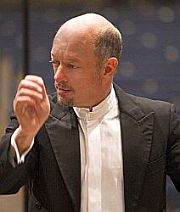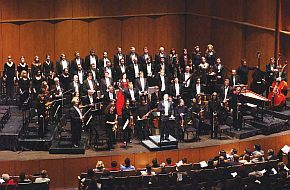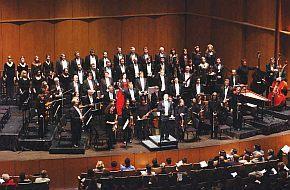
The concert centered on Giovanni Battista Pergolesi’s Stabat Mater (1736) and four of George Frideric Handel’s Italian Duets. The Stabat Mater, for soprano, alto, strings, and basso continuo, written in the last month of Pergolesi’s 26 years on the planet, was blessed by a near-perfect match of vocal soloists. Shining soprano Mary Wilson, a gift from the gods if I ever heard one, may possess a bigger and more emotionally versatile instrument than countertenor Ian Howell, but in the seven duets of Pergolesi’s 12-aria masterpiece she reined herself in to create a sublime blend with the melancholy at the core of his lovely, more modestly sized voice.
Indeed, as the work described Mary weeping before the body of Jesus, her crucified son, Wilson’s empathetic vocalism seemed to inspire Howell's most expressive singing of the evening. Their coloratura in “Fac, ut ardeat cor meum” (Make me feel as thou has felt) was perfectly executed, and the blend in the closing “Quando corpus morietur” (While my body here decays) and the Amen was impeccable. As showy as the work may be, the singers’ identification with the sorrowful text remained supreme. By the time Thomas, directing from the organ, paused after the fourth duet to allow his five string players to retune, a woman seated in the row in front of me could not refrain from sighing the word “beautiful” as she finally let herself breathe.
The five solos were just as wonderful, with flawless trills and spot-on intonation. Thanks to Howell’s emotional affect, the joyous incongruity of Pergolesi’s “Quae moerebat et dolebat” (Christ above in torment hangs) was rendered inconsequential. The countertenor especially stood out in “Fac ut portem Christi mortem” (meaning “Let me to my latest breath,” at least according to one translator), where the heart at the core of his soulful sound predominated.
The instrumentalists played far more than an accompanist role. Violinists Elizabeth Blumenstock and Janet Strauss perfectly matched Wilson’s shining clarity in her first solo, “Cuius animam gementem” (Through her weeping soul). Later, when the soprano softened exquisitely in “Vidit suum dulcem natum” (She held her gentle child), the entire ensemble, including violist Aaron Westman, violoncellist William Skeen, and contrabassist Steve Lehning, softened as if one. This ideal balance between voices and instruments, far more poetic than in Christopher Rousset’s recording with Les Talens Lyriques, Barbara Bonney, and Andreas Scholl, helped make the performance as moving as it was.
In the second half, the two soloists joined most of the strings and Corey Jamason on harpsichord for Handel’s Tanti strali al sen mi scocchi. Inspired by the first sunny line, which translates into something like “Many arrows strike at my breast, like the many stars that are in the sky,” Wilson produced strings of shiny tone kissed by youth and springtime. Her joy was infectious, even if Howell seemed unable to rise above the melancholic.
Familiar Air Given New Life
Surrounding that duet were two instrumental works. Domenico Gallo’s modest Sonata No. 1 in G Major, long attributed to “Pergolese,” opens with one of
But it was in Arcangelo Corelli’s far greater Concerto Grosso Op. 6, No. 1 in D Major, rounded out by program notes by SFCV’s own Michael Zwiebach, that the Bay Area’s world-class Baroque specialists truly shone. Anyone seeking to understand the spiritual implications of the word “grace” had only to listen to the violins in the second Largo of Corelli’s opening movement, where Strauss’ timbre perfectly complemented Blumenstock’s incomparable shine. The performance was transcendent.
The program closed with three duets from Handel operas. Wilson was at her innocent, sweet, and bright best at the start of the duet “Caro! Bella! Più amabile beltà” (My love! My fair one! A more amiable beauty), from Giulio Cesare. No longer holding back, and for good reason, she at one point rose above the stave, trumping her Caesar. In the subsequent duet from Ariodante, it was impossible not to surrender to the beauty of her voice. And, at the end of her first verse in the final duet, “Scherzano sul tuo volto” (Your face abounds with grace and charm), from Rinaldo, the words “a mille, a mille” (by the thousands, by the thousands) were flicked off like little bursts of light. Marvelous.
Of course there were encores. Wilson took “Lascia, ch’io pianga” (Let me weep), also from Rinaldo, at a slower than ideal pace. Although the instrumental sighs were too emphatic, her effortless increase in volume in her recapitulation was superb. Others may produce more tears in the voice, but her singing was exquisite.
Howell was unable to dominate the chamber accompaniment in the vengeful “Al lampo dell’armi” (With the flash of arms), from Giulio Cesare, one of the arias on his new recording from no less than the American Bach Soloists themselves. He seemed to nail all the notes in the demanding runs, yet his limited range of vocal color demonstrated why countertenor David Daniels reigns supreme in such bellicose repertoire.

